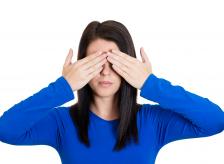Toxic Habits: Avoidance
In Part 2 of the series on surprisingly toxic habits the Savvy Psychologist discusses the 3 reasons why you should avoid avoidance. (Hint: Like ostensibly loose slot machines or helping a Nigerian prince via email, avoidance promises a big payoff, but actually leaves you worse off than before).

This week, we’ll talk about avoidance, which is the technical term for plugging your ears and yelling, “I can’t heeaar you!” whenever something distressing crosses your path. In short, it’s a way of dealing – or not dealing, as it were – with something stressful.
Avoidance is tricky because it works…kind of. It helps us steer clear of stress and negative emotion in the short term, but it costs us dearly over the long term. It’s like successfully tiptoeing around a sleeping pitbull only to realize you’re now trapped in the corner.
Examples of avoidance run the gamut – you may avoid people who make you nervous, situations that make you sweat, or places that freak you out. For example, you might avoid working on your novel because you’re afraid the critics will hate it. You may have stopped traveling because you’re worried the plane will crash. And how many of us haven’t been to the dentist in years?
See also: How to Overcome Your Fear of Flying (Part 1) and (Part 2)
But avoidance isn’t only hiding from something scary out there – it can also mean hiding from something scary inside yourself, most often negative emotions like fear, anxiety, emptiness, frustration, worthlessness, or shame. You might soothe yourself with drugs, alcohol, emotional eating, or zoning out in front of a screen. Procrastination is a classic form of avoidance, as is picking fights to avoid dealing with the actual emotion that’s bothering you (that’s right, anger is often more acceptable to our brains than feeling hurt or scared).
So aside from the obvious downsides of drowning your sorrows or playing Grand Theft Auto when you’re supposed to be working, why is avoidance so bad? Here are the 3 big costs of avoidance. (And, don’t worry, in a future episode, we’ll cover how to break your avoidance habit):
Avoidance Teaches You That Everyday Things Are Dangerous

Brian hates social gatherings, like parties. He thinks he’s an awkward conversationalist, so he forces himself to attend when he has to, but he spends a lot of time in the bathroom or looking at his phone so he doesn’t have to talk to anyone. This works well, in a way – staring into his drink or scrolling through his email helps Brian keep his anxiety in check.
But whenever he heads for the men’s room or pulls out his phone at a party, his belief that he’s awkward gets a little stronger. Every time he avoids talking to people in order to lessen his anxiety, the belief gets underscored again. The result? His own avoidance convinces his brain that talking to people at parties must be really, really dangerous.
In sum, avoidance teaches your brain that whatever you’re avoiding is dangerous, even if it’s just chatting about the weather.
Avoidance Makes Your World Smaller
When we avoid what we’re afraid of, not only does danger grow in our minds, but also we whittle away the places we’ll go, the people we’ll hang out with, and the things we’ll try.
The clearest illustration of this comes from folks who suffer from panic attacks.
For instance, Brett had a panic attack at the gym, so he stopped exercising, thinking he shouldn’t exert himself. But then he had another attack in a crowded conference room at work and took time off to get over the humiliation and to psych himself up to return. After a third attack, it dawned on him that he probably shouldn’t be driving. In short, in the space of three panic attacks, avoidance of exertion, work, and driving narrowed his world essentially to resting on the couch.
Of course, avoidance isn’t always this extreme. But subtle avoidance can suck the enjoyment out of life, too. So think about where you’re dissatisfied with your life. If you’re lonely, you may be avoiding social situations. If you’re resentful, it’s possible that you’re avoiding communicating your needs. If you binge eat, consider the possibility that you’re avoiding other, harder-to-face emotions. Of course, not all woes can be explained by avoidance, but too often, avoiding our fears becomes a habit. We live our lives trying to dodge the elephant in the room.
Avoidance Maintains Mental Health Problems

She’s right – avoidance is the core of PTSD, panic, social anxiety, and every phobia in existence. It’s also an important driver of depression and OCD. It even has it’s own personality disorder, appropriately called Avoidant Personality Disorder.
OK, if avoidance is so bad, what should we be doing instead? What’s the opposite of avoidance? The answer is approach, which is the technical term for facing your fears. How to do that? Stay tuned – we’ll cover the two best ways to open your eyes and unplug your ears next week on the Savvy Psychologist.
Please note that all content here is strictly for informational purposes only. This content does not substitute any medical advice, and does not replace any medical judgment or reasoning by your own personal health provider. Please always seek a licensed physician in your area regarding all health related questions and issues.
You May Also Like…







